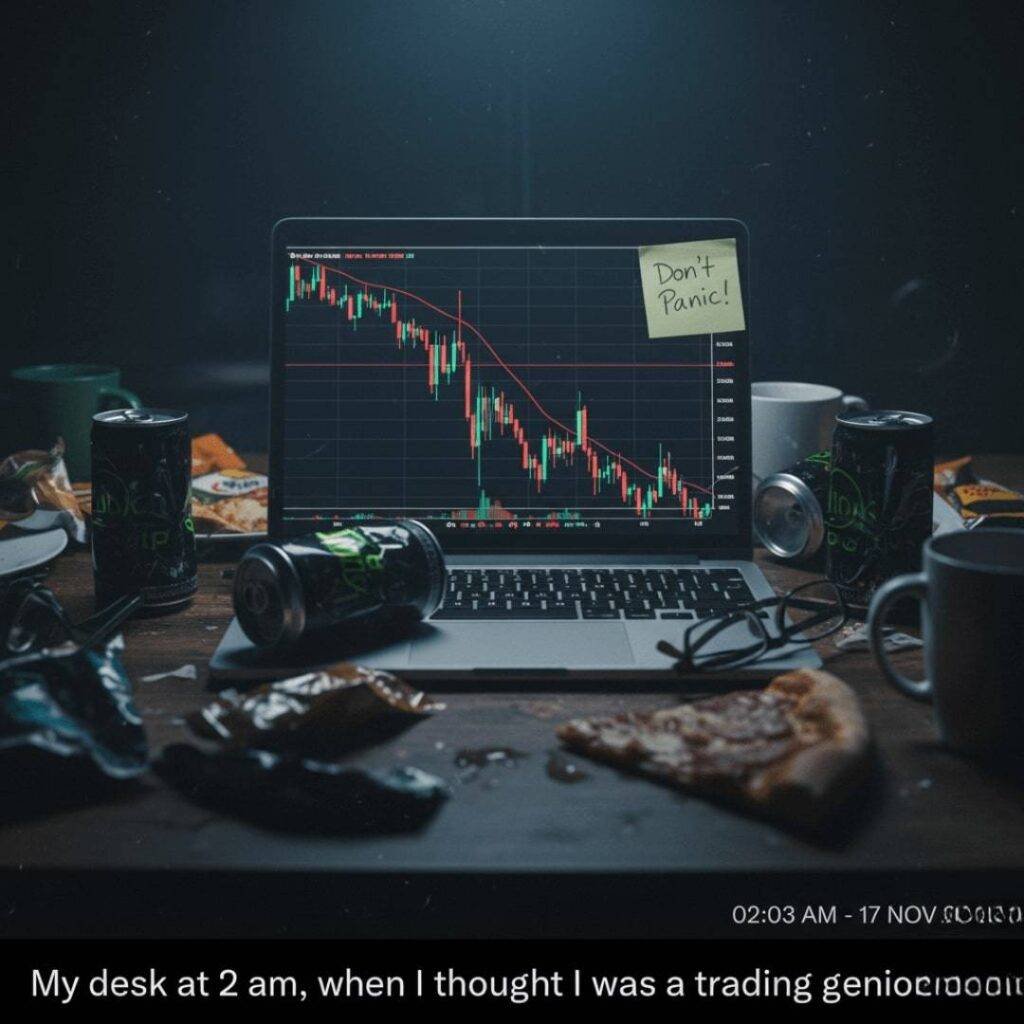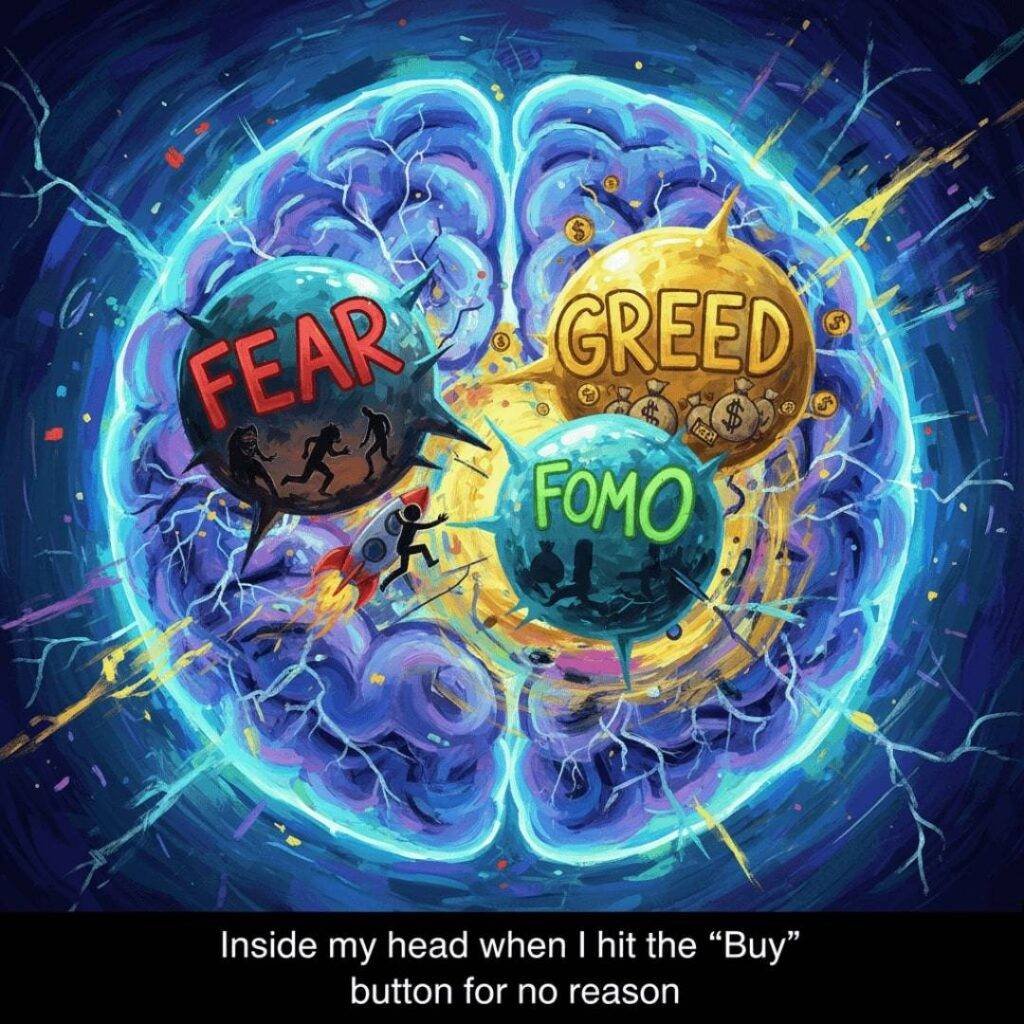The Psychology of Stock Trading Sucks You In
Man, the psychology of stock trading is a wild ride. I’m sitting here in my cramped Brooklyn apartment, the radiator hissing like it’s judging me, and I can still feel the sweaty panic of my first big trading loss. It was 2023, and I was all in on some hyped-up tech stock—y’know, the kind X was buzzing about. I’m scrolling through posts, heart racing, thinking I’m about to be the next Wolf of Wall Street. Spoiler: I wasn’t. My emotions were like, “Buy more!” while my bank account screamed, “Dude, stop!” That’s the thing—stock market emotions are like a bad ex: they show up, mess with your head, and leave you broke.
I remember staring at my laptop screen, the glow burning my eyes, as the stock tanked 20% in a day. My coffee was cold, my dog was whining, and I was muttering, “This is fine,” like that meme. Fear and greed in trading? Yeah, I was their poster child. I didn’t just lose money; I lost sleep, sanity, and probably a few years off my life.
Why Emotions in Trading Are Your Worst Enemy
The psychology of stock trading is like a mental cage match. You’re not just battling the market; you’re battling yourself. I learned this the hard way when I FOMO’d into a meme stock because some rando on X said it was “going to the moon.” Spoiler again: it crashed harder than my confidence. Here’s what I figured out about how emotions affect stock trading:
- Fear: You see red on your screen, and suddenly you’re selling everything like the world’s ending. I sold a solid stock once because I panicked during a dip. Guess what? It rebounded the next week.
- Greed: You’re up 10%, and your brain’s like, “Hold for 100%!” I held onto a stock way past its peak, dreaming of a yacht. Now I’m still renting.
- FOMO: Everyone’s talking about a hot stock, and you jump in without research. Been there, lost $500 on a “sure thing” because I didn’t want to miss out.

How I Screwed Up My Stock Trading Mindset
Let’s get real: my trading psychology was trash. I’d check my portfolio every five minutes, heart pounding like I was in a thriller movie. One time, I was at a bodega grabbing a sandwich, and I legit dropped my pastrami on rye when I saw a stock dip 5%. The guy behind the counter gave me this look like, “Bro, it’s just a sandwich.” But it wasn’t just a sandwich—it was my whole vibe. I was letting stock market emotions run my life.
I’d read posts on X, get all hyped, and buy without thinking. Or I’d see some doom-and-gloom news and sell everything. My big “aha” moment? When I realized I was trading like I was playing slots in Atlantic City. No strategy, just vibes. And vibes don’t pay the bills.
Tips to Keep Your Trading Psychology in Check
I’m no Warren Buffett, but I’ve picked up some tricks to stop emotions from killing my profits. Here’s what’s helped me not be a total disaster at the psychology of stock trading:
- Set Rules and Stick to ‘Em: I made a rule: no trading after 10 p.m. or three beers. Sounds dumb, but it saved me from impulse buys.
- Take a Breather: When I’m freaking out, I step away. Like, go pet my dog or eat a slice of pizza. Clears the head.
- Do Your Homework: I read up on companies now, not just X hype. Check out Investopedia for solid basics.
- Limit Screen Time: Staring at charts all day makes you nuts. I set timers to stop obsessing.

The Time I Thought I Was a Trading Genius
Okay, here’s a humiliating story. Last summer, I was at a rooftop bar in Manhattan, feeling like a big shot because one stock I bought was up 15%. I’m sipping a $20 cocktail, bragging to my buddy about my “trading strategy” (which was basically “follow the X hype”). Next day? Stock crashed. I’m hungover, checking my phone in a Starbucks, and my portfolio’s bleeding. The barista’s like, “You okay, man?” and I’m just nodding, dying inside. That’s what happens when you let greed and ego drive your stock trading mindset.
I learned emotions in trading are like that friend who swears they’re “fine” after five shots. They’re not fine, and neither’s your portfolio if you let ‘em take the wheel. I started journaling my trades—sounds nerdy, but writing down why I bought or sold helped me spot my dumb patterns. Like, “Oh, I bought this because some dude on X said it’s ‘undervalued’?” Yikes.
Resources to Master Your Trading Psychology
If you’re struggling with the psychology of stock trading like I was, here are some resources that helped me not suck as much:
- The Motley Fool for beginner-friendly tips.
- Behavioral Finance on Khan Academy for why we’re all irrational idiots sometimes.
- Books like Thinking, Fast and Slow by Daniel Kahneman—changed how I see my brain’s bad decisions.

Wrapping Up This Messy Chat on Stock Market Emotions
Look, the psychology of stock trading is a beast. I’m still learning, still screwing up, but I’m getting better at not letting emotions tank my profits. It’s like, you gotta treat trading like a job, not a rollercoaster. My apartment smells like burnt toast right now, and I’m still checking my stocks too much, but I’m trying, okay? If I can get a grip on my stock market emotions, you can too. Start small, make rules, and don’t be me at 2 a.m. panic-selling because of a bad X post.




